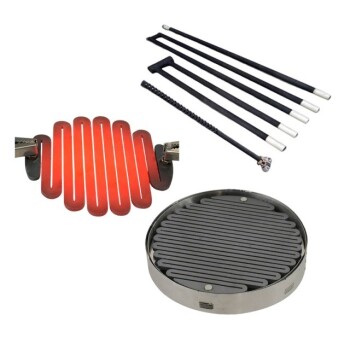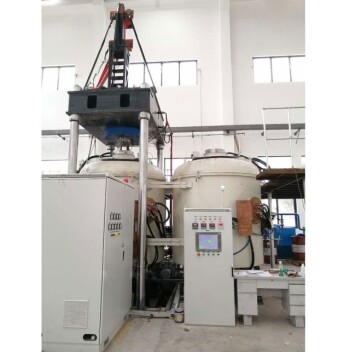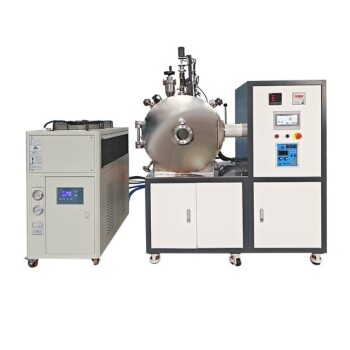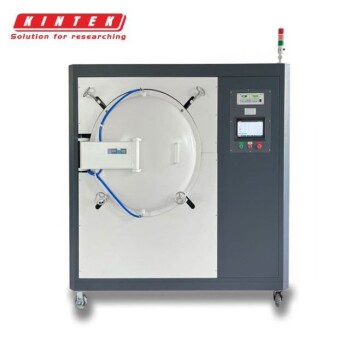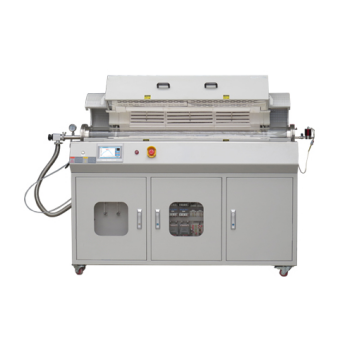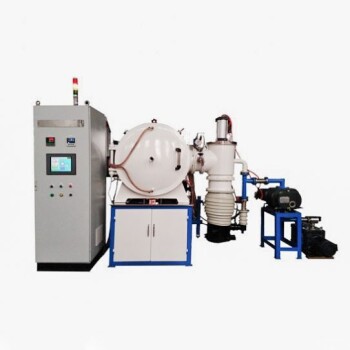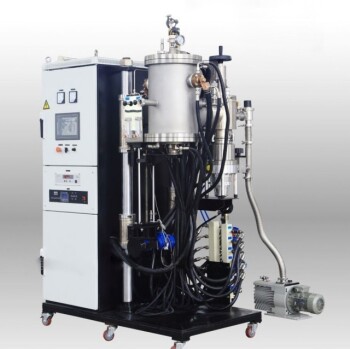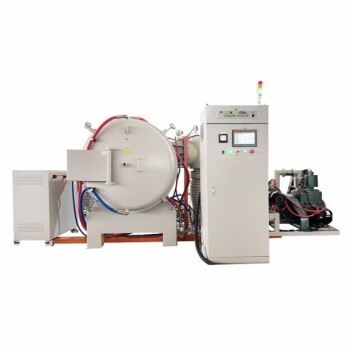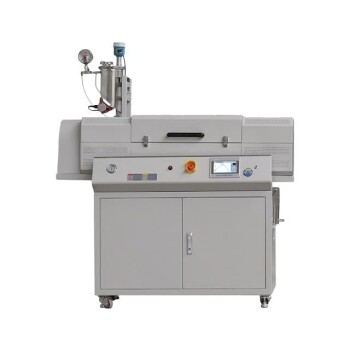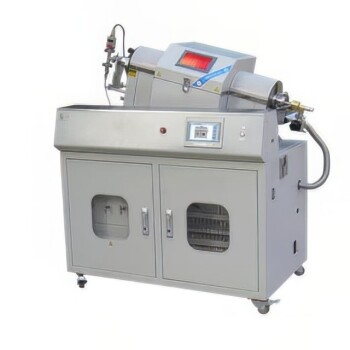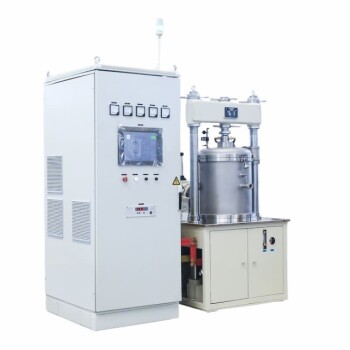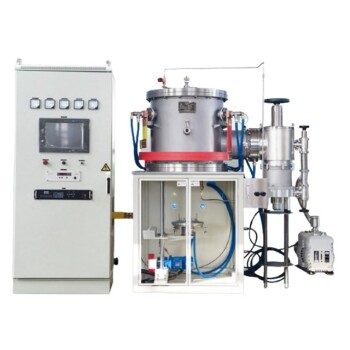Induction heating achieves exceptional precision because it treats heat generation as a programmable electrical parameter, not an external thermal process. By precisely adjusting the current, frequency, and duration of an electromagnetic field, you gain direct, instantaneous control over where heat is generated within a conductive material, how deep it penetrates, and how quickly the target temperature is reached.
The core advantage of induction is its ability to generate heat directly inside the part itself. This eliminates the thermal lag and inefficiencies of external heat sources like flames or furnaces, allowing for a level of speed, localization, and repeatability that is unmatched by conventional methods.
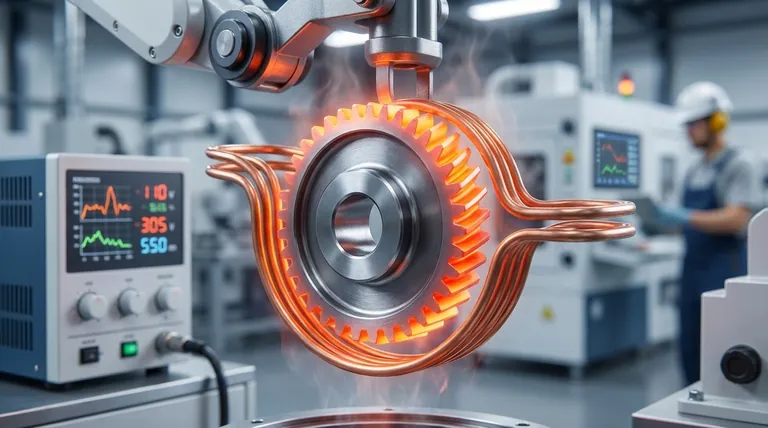
The Physics of Precision: How Induction Works
To understand why induction is so precise, you must first understand its fundamental mechanism. Unlike a furnace that heats the air around a part, induction makes the part its own heat source.
Principle 1: Direct Internal Heat Generation
An induction heater uses an alternating current flowing through a copper coil to create a powerful, oscillating magnetic field. When a conductive workpiece (like steel) is placed within this field, it induces electrical currents—known as eddy currents—to flow inside the material.
The material's natural resistance to the flow of these eddy currents generates instantaneous and localized heat, a phenomenon called the Joule effect. There is no external flame or heating element; the heat is born directly within the part.
Principle 2: Precise Energy Delivery via Electrical Control
This internal heating mechanism is governed by predictable electrical laws, giving you three primary levers for control.
- Current & Power: The magnitude of the current in the coil dictates the strength of the magnetic field. A higher power setting increases the rate of energy delivery, allowing for extremely rapid heating.
- Frequency: The frequency of the alternating current is the most critical parameter for precision. It controls the depth of heat penetration due to a principle called the skin effect. Higher frequencies confine the eddy currents to a very thin layer on the surface, which is ideal for case hardening. Lower frequencies allow the heat to penetrate deeper into the part.
- Time: The duration for which the magnetic field is applied determines the total energy absorbed by the workpiece and, therefore, its final temperature. Modern systems control this with millisecond accuracy.
Principle 3: Targeted Heat Zones via Coil Geometry
The precision of induction is not just electrical; it is also physical. The shape and proximity of the induction coil dictate the shape of the magnetic field.
This means you can design a coil that precisely mirrors the geometry of the area you wish to heat. You can heat the teeth of a gear while leaving the hub cool, or heat a narrow band on a shaft for shrink-fitting without affecting the rest of the component.
Translating Control into Manufacturing Excellence
This combination of electrical and physical control provides tangible benefits in high-performance manufacturing environments.
Unmatched Repeatability
Because the process is defined by stable electrical variables (volts, amps, Hz) and time, it is exceptionally repeatable. Once a heating profile is established, the system can execute it thousands of times with virtually no deviation, ensuring consistent quality from the first part to the last.
Localized Heat Treatment
The ability to heat only a specific portion of a component is a transformative advantage. This minimizes energy waste and, more importantly, reduces part distortion and warping by leaving the bulk of the material cool and structurally unaffected.
Rapid Heating and Cooling Cycles
Induction can bring a metal surface to its target temperature in seconds. This speed is not just for efficiency; it allows for metallurgical transformations, such as creating a fine-grained martensitic structure in steel, that are difficult or impossible to achieve with the slow thermal inertia of a furnace.
Understanding the Trade-offs and Considerations
While powerful, induction is not a universal solution. Achieving its precision requires a clear understanding of its operational requirements.
The Critical Role of Coil Design
The mantra of induction heating is "the coil is key." The precision of the process is entirely dependent on a properly designed and fabricated coil. Each unique part geometry often requires a custom coil, which represents a significant engineering and tooling investment.
Material Dependency
Induction heating works only on materials that are electrically conductive. Its efficiency varies dramatically based on the material's resistivity and, for magnetic materials like carbon steel, its magnetic permeability. It is ineffective for heating insulators like ceramics or most polymers without the use of a conductive susceptor.
Initial System Cost
The initial capital investment for a high-frequency power supply, cooling system, and custom coil work can be substantially higher than for a simple gas furnace or torch setup. The return on this investment is realized through higher throughput, superior quality, reduced scrap, and lower energy consumption per part.
Is Induction the Right Choice for Your Application?
Choosing the right heating technology depends entirely on your specific manufacturing goal.
- If your primary focus is high-volume, repeatable surface hardening: Induction is the superior choice due to its speed, precise depth control via frequency, and part-to-part consistency.
- If your primary focus is joining complex assemblies (brazing/soldering): The localized heating of induction minimizes the risk of thermal damage to nearby sensitive components.
- If your primary focus is bulk heat treatment or stress-relieving large, simple parts: A conventional batch furnace may be a more practical and cost-effective solution.
- If you are processing non-conductive materials: Induction is not a direct solution and would require exploring other technologies or using a conductive susceptor.
Ultimately, adopting induction heating means shifting your perspective from managing temperature to programming energy.
Summary Table:
| Key Control Parameter | Impact on Precision | Ideal For |
|---|---|---|
| Frequency | Controls depth of heat penetration (skin effect) | Surface hardening, case depth control |
| Power & Current | Determines the rate of energy delivery and heating speed | Rapid heating cycles, high throughput |
| Coil Geometry | Defines the shape and location of the heat zone | Targeted heating of complex part geometries |
| Time | Governs total energy absorbed and final temperature | Precise temperature profiles, repeatable cycles |
Ready to Program Precision into Your Manufacturing Process?
At KINTEK, we leverage our exceptional R&D and in-house manufacturing capabilities to provide advanced thermal processing solutions. Our expertise in high-temperature furnace technology extends to precision induction heating systems.
Whether your application requires rapid surface hardening, localized brazing, or complex heat treatment, our team can help you harness the power of direct, programmable energy delivery. We specialize in developing tailored solutions to meet the unique demands of high-performance manufacturing environments.
Contact KINTEK today to discuss how our precision heating solutions can enhance your repeatability, reduce distortion, and boost your production efficiency.
Visual Guide

Related Products
- Silicon Carbide SiC Thermal Heating Elements for Electric Furnace
- 600T Vacuum Induction Hot Press Vacuum Heat Treat and Sintering Furnace
- Vacuum Induction Melting Furnace
- Vacuum Heat Treat Furnace with Ceramic Fiber Liner
- Split Multi Heating Zone Rotary Tube Furnace Rotating Tube Furnace
People Also Ask
- What parameters does the IEC standard specify for heating elements? Ensure Safety and Performance
- What are the advantages of silicon carbide heating elements in dental furnaces? Boost Zirconia Sintering Quality
- What is the operating temperature of SiC? Unlock Reliable Performance Up to 1600°C
- What heating elements are used in high-temperature tube furnaces? Discover SiC and MoSi2 for Extreme Heat
- What temperature ranges are recommended for SiC versus MoSi2 heating elements? Optimize Your Furnace Performance
